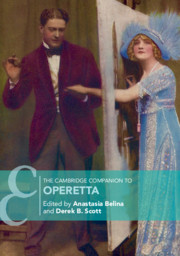Book contents
- The Cambridge Companion to Operetta
- Cambridge Companions to Music
- The Cambridge Companion to Operetta
- Copyright page
- Contents
- Illustrations
- Tables
- Music Examples
- Notes on Contributors
- Chronology, 1855–1950
- Introduction
- Part I Early Centres of Operetta
- 1 French Operetta: Offenbach and Company
- 2 Viennese Golden-Age Operetta: Drinking, Dancing and Social Criticism in a Multi-Ethnic Empire
- 3 London and Gilbert and Sullivan
- 4 Hungarians and Hungarianisms in Operetta and Folk Plays in the Late-Habsburg and Post-Habsburg Era
- 5 Operetta in the Czech National Revival: The Provisional Theatre Years
- Part II The Global Expansion of Operetta
- Part III Operetta since 1900
- Select Bibliography
- Index
- References
3 - London and Gilbert and Sullivan
from Part I - Early Centres of Operetta
Published online by Cambridge University Press: 14 November 2019
- The Cambridge Companion to Operetta
- Cambridge Companions to Music
- The Cambridge Companion to Operetta
- Copyright page
- Contents
- Illustrations
- Tables
- Music Examples
- Notes on Contributors
- Chronology, 1855–1950
- Introduction
- Part I Early Centres of Operetta
- 1 French Operetta: Offenbach and Company
- 2 Viennese Golden-Age Operetta: Drinking, Dancing and Social Criticism in a Multi-Ethnic Empire
- 3 London and Gilbert and Sullivan
- 4 Hungarians and Hungarianisms in Operetta and Folk Plays in the Late-Habsburg and Post-Habsburg Era
- 5 Operetta in the Czech National Revival: The Provisional Theatre Years
- Part II The Global Expansion of Operetta
- Part III Operetta since 1900
- Select Bibliography
- Index
- References
Summary
Scholars writing about Gilbert and Sullivan prefer ‘Savoy Operas’ to ‘operettas’, taking their lead from history and often hoping to place these shows on a par with more highly regarded comic operas. Whatever one calls them, they provide plenty of interest for musicologists working on operetta, and the status anxiety surrounding them is especially revealing. An opening section on their history shows that concerns over respectability lay behind every aspect of the way the shows were created and marketed, and formed the background to changing perceptions of the two creators. New critical attention is given here to the continued entanglement of ethical and aesthetic concerns in scholarly writing on composer and librettist. The second section addresses distinctive features of the content, in particular Gilbert’s legal influences and stagecraft, and Sullivan’s musical deadpanning. Anxiety appears again over the quotations and references in both the music and text, but this can be understood as a fundamental part of the audience experience, closely tied to the creation of class identity. Finally, a discussion of modern Gilbert and Sullivan performances and enthusiast communities serves as a springboard for considering issues of politics in staging and performance and points the way to possible left-wing interpretations.
Keywords
- Type
- Chapter
- Information
- The Cambridge Companion to Operetta , pp. 47 - 60Publisher: Cambridge University PressPrint publication year: 2019

